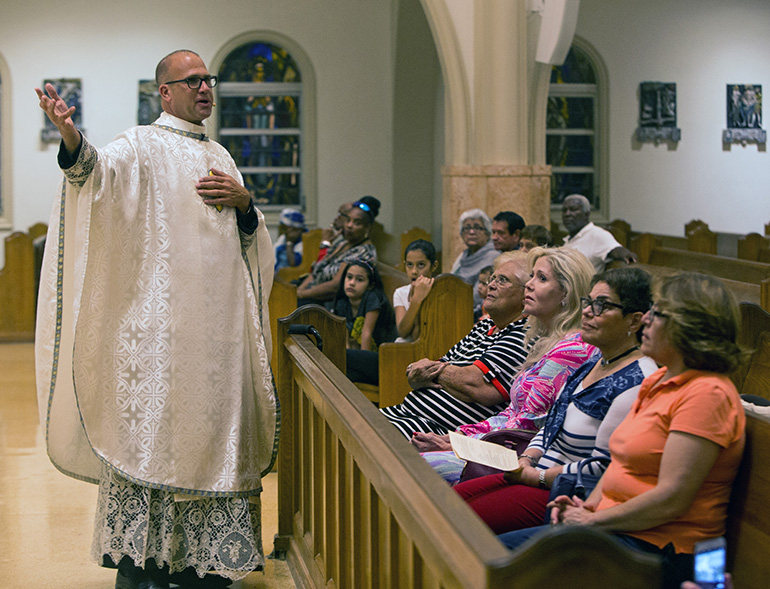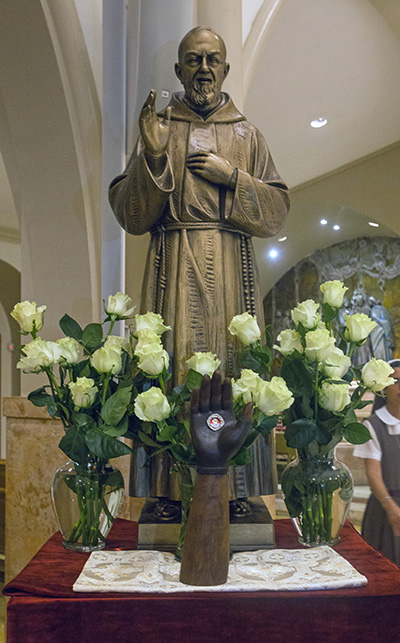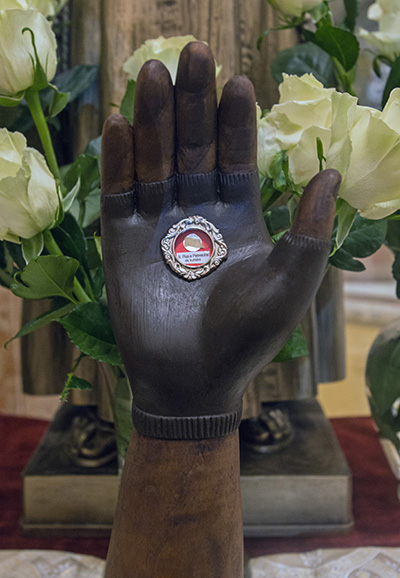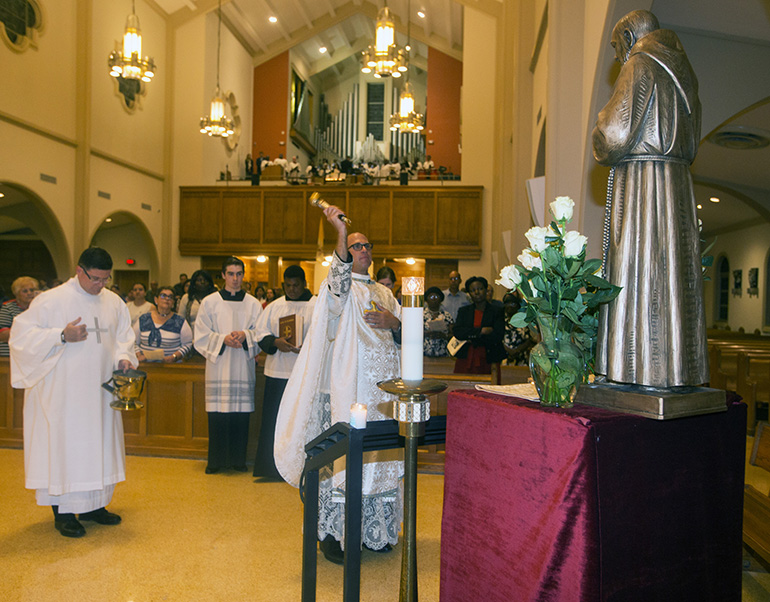By Marlene Quaroni - Florida Catholic

Photographer: MARLENE QUARONI | FC
Father Christopher Marino motions toward the statue of Padre Pio which Laura Fabar-Equels, seated in the first row wearing a pink dress, and her husband donated to St. Mary's Cathedral.
MIAMI | Laura Fabar-Equels went to Pietrelcina, Italy, with a Christmas list of people’s requests for the intercession of St. Padre Pio in their various problems.
“St. Padre Pio is a miracle worker,” said Fabar-Equels, who along with her husband, Tom Equels, donated a statue of the saint to St. Mary Cathedral. She sat in the front row as Father Christopher Marino, the cathedral’s rector, blessed the statue during the third annual St. Padre Pio Mass held on the eve of his feast day, Sept. 23. The statue will occupy a permanent place on the south side of the cathedral vestibule.

Photographer: MARLENE QUARONI | FC
This newly-donated statue of St. Padre Pio will occupy a permanent place on the south side of the cathedral vestibule.

Photographer: MARLENE QUARONI | FC
Those who attended the annual Padre Pio Mass at St. Mary Cathedral also venerated this first-class relic of the saint's garment stained with blood from his stigmata.
Father Luis Garcia, an archdiocesan priest who has collected relics of the saint, started the tradition of an annual Mass in St. Padre Pio’s honor.
Servants of the Pierced Heart of Jesus and Mary brought a relic of the saint, which they keep at their convent, to the Mass for veneration. Some of those at the Mass placed devotional candles on a stand in front of the saint’s statue.
Among the Padre Pio miracles Fabar-Equels mentioned was that of a woman who couldn’t get pregnant prayed. After praying to the saint, she became pregnant and gave birth on the saint’s feast day. Fabar-Equels’ grandson was born with a club foot which doctors said would mean that he would have limited mobility. After Fabar-Equels prayed to St. Padre Pio, her grandson’s club foot was miraculously healed.
“I was drawn to Padre Pio when I read his book as a youngster,” she said. “I wanted to visit his shrine at San Giovanni Rotondo, Italy. I didn’t get the opportunity till later in life.”
Fabar-Equels said St. Padre Pio helped change her 88-year-old mother’s attitude when she was suffering from dementia.
“She was aggressive and hostile to me,” said Fabar-Equels. “I went to St. Padre Pio’s shrine and prayed for her. I thought she would be angry when I called her to tell her I was in Italy. But there was a complete transformation. She said she was delighted that I went to Italy. She told me that I needed to get away.”
Padre Pio, who lived from 1887 to 1968, was born in Pietrelcina, Italy, as Francesco Forgione. At a young age, he made the decision to dedicate his life to God. At 15, he entered the novitiate of the Capuchin friars at Morcone, Italy, near his hometown. He took the name of Friar Pio, in honor of Pope St. Pius I whose relic is preserved in the Santa Ana Chapel in Pietrelcina. He studied for the priesthood and was ordained in 1910.
He suffered from a number of illnesses throughout his life. He is known for exhibiting stigmata, bodily marks, pain and bleeding in locations corresponding to the crucifixion wounds of Jesus Christ. Many disputed the validity of his wounds and his superiors placed him under restriction.
“Despite his afflictions he never became vengeful or difficult,” said Father Marino, who celebrated the Mass in Latin. “He recognized, in his suffering, Jesus Christ on the cross. We recently suffered from Hurricane Irma and the storm’s aftermath. It was a moment to look beyond broken trees and houses. Maybe Jesus is asking us to spend more time with our family, to use our finances for stewardship. Jesus is calling us to look at the bigger picture. When we look beyond our own little world, we see the suffering of others.”
St. Padre Pio sometimes spent 20 hours a day in the confessional interceding between God and man to take away sins.
“Let us remember Padre Pio as a saint of mercy,” Father Marino said. “His statue has his right hand raised. We must follow his hand to the confessional and altar. St. Padre Pio, pray for us!”

Photographer: MARLENE QUARONI | FC
Father Christopher Marino blesses the statue of St. Padre Pio which was donated to St. Mary Cathedral.

